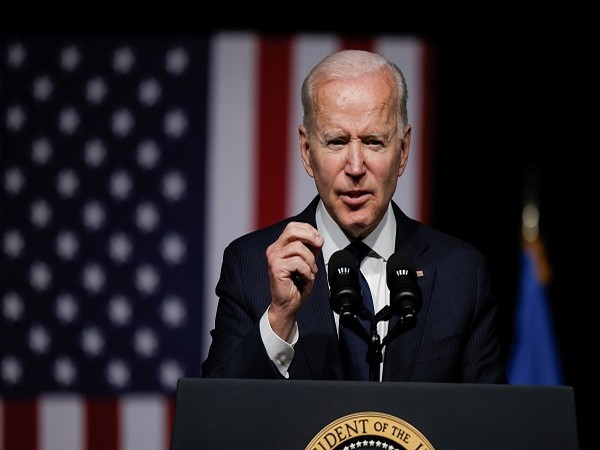Are Democrats confident Biden's infrastructure bill will pass? 'Nope'
Senator Joe Manchin, a key Democratic moderate with the power to block legislation in the Senate, said on Thursday that bill should cost no more than $1.5 trillion - far lower than the $3.5 trillion price tag floated by Biden. House Speaker Nancy Pelosi, who had earlier promised moderates a vote on the smaller $1 trillion infrastructure bill this week, predicted the party would ultimately resolve its differences on both pieces of legislation.

President Joe Biden's domestic policy agenda appeared to be at risk in the U.S. Congress on Thursday, as his fellow Democrats struggled to line up support for a plan to double spending on roads, bridges and other infrastructure. The No. 2 Democrat in the House of Representatives had a one-word answer when reporters asked if he was confident the $1 trillion bill would pass in a vote scheduled later in the day.
"Nope," said Representative Steny Hoyer. Failure would be a stinging setback for Biden. The infrastructure legislation has already passed the Senate with Republican and Democratic support. But it could fall victim to an impasse between Democratic moderates and progressives over a multitrillion-dollar bill that would bolster social services and tackle climate change.
Lawmakers on the party's left flank have said they will not vote for the infrastructure bill unless they feel certain their priorities will be reflected in the social-spending bill. Senator Joe Manchin, a key Democratic moderate with the power to block legislation in the Senate, said on Thursday that bill should cost no more than $1.5 trillion - far lower than the $3.5 trillion price tag floated by Biden.
House Speaker Nancy Pelosi, who had earlier promised moderates a vote on the smaller $1 trillion infrastructure bill this week, predicted the party would ultimately resolve its differences on both pieces of legislation. "We are in a good place right now. We are making progress," Pelosi said at a news conference. But she declined to say whether it would pass on Thursday.
With razor-thin majorities in Congress, Democrats cannot afford to lose many votes if they want to pass their agenda. And they are unlikely to win much support from House Republicans eager to take back the majority in the 2022 midterm elections. Meanwhile, Congress was poised to approve new government funding through Dec. 3, which would head off the risk of a partial government shutdown when current funding expires at midnight. Both the House and the Senate were expected to pass the temporary funding bill by that deadline.
Republican leaders in both chambers said they would support that legislation. Besides keeping government operations running, the stopgap spending bill would provide aid for communities hard hit by hurricanes, wildfires and other natural disasters. Money to help Afghan refugees is included as well.
Manchin's proposed price tag of $1.5 trillion was sure to rile progressives, who initially proposed $6 trillion in new spending. On Thursday, he said the bill should also help natural-gas producers, who have a large presence in his home state of West Virginia. Environmentalists have said natural gas is not a long-term energy solution. Manchin also said lawmakers should first sort out what taxes are needed to cover the cost of new spending. He said the differences could take weeks to resolve.
Another Democratic moderate, Senator Kyrsten Sinema, has met with Biden multiple times to discuss the bill but has not publicly said https://www.reuters.com/world/us/democrat-sinema-spotlight-obstacle-biden-economic-agenda-2021-09-30 how large she thinks it should be or what it should look like. DEBT-CEILING THREAT
Yet another battle with serious consequences was percolating in Congress. Democrats and Republicans continued brawling over giving the Treasury Department additional borrowing authority beyond the current statutory limit of $28.4 trillion. A historic U.S. debt default could occur around Oct. 18, Treasury Secretary Janet Yellen has estimated, if Congress fails to act.
Republicans want no part of the debt limit increase, saying it is Democrats' problem since they control Congress and the White House. The House late on Wednesday approved a bill suspending the debt limit through December 2022. The Senate could vote on it "as early as next week," Senate Majority Leader Chuck Schumer said, but Republicans are expected to block it again.
Yellen said on Thursday it would be a "catastrophe" if Congress does not raise the debt ceiling. The uncertainty is starting to filter into financial markets https://www.reuters.com/business/finance/wall-street-nervous-about-washington-debt-ceiling-warnings-sound-2021-09-29, though few believe the nation will ultimately default. The looming debt crisis is rattling Americans on both sides of the political spectrum, according to an Ipsos national opinion poll conducted for Reuters on Tuesday and Wednesday.
It showed that 65% of adults, including eight in 10 Democrats and five in 10 Republicans, are "very" or "somewhat" concerned that Congress will fail to reach a debt deal in time. The poll also found that 30% think congressional Republicans deserve the most blame if there is a government shutdown, while 21% would blame Democrats in Congress and 16% would blame Biden.
(This story has not been edited by Devdiscourse staff and is auto-generated from a syndicated feed.)
ALSO READ
Mortgage Fraud Allegations Trigger Investigation into Democratic Congressman
Hegseth announces start of effort to 'eliminate ISIS fighters' and weapons sites in Syria following deaths of Americans, reports AP.
Mashatile Hails Titus Mafolo as a Pillar of Democratic Thought, Public Service
Democrats Choose Silence Over Strategy: Avoiding Internal Review
Strong Opposition Boosts Democratic Proceedings in Haryana










